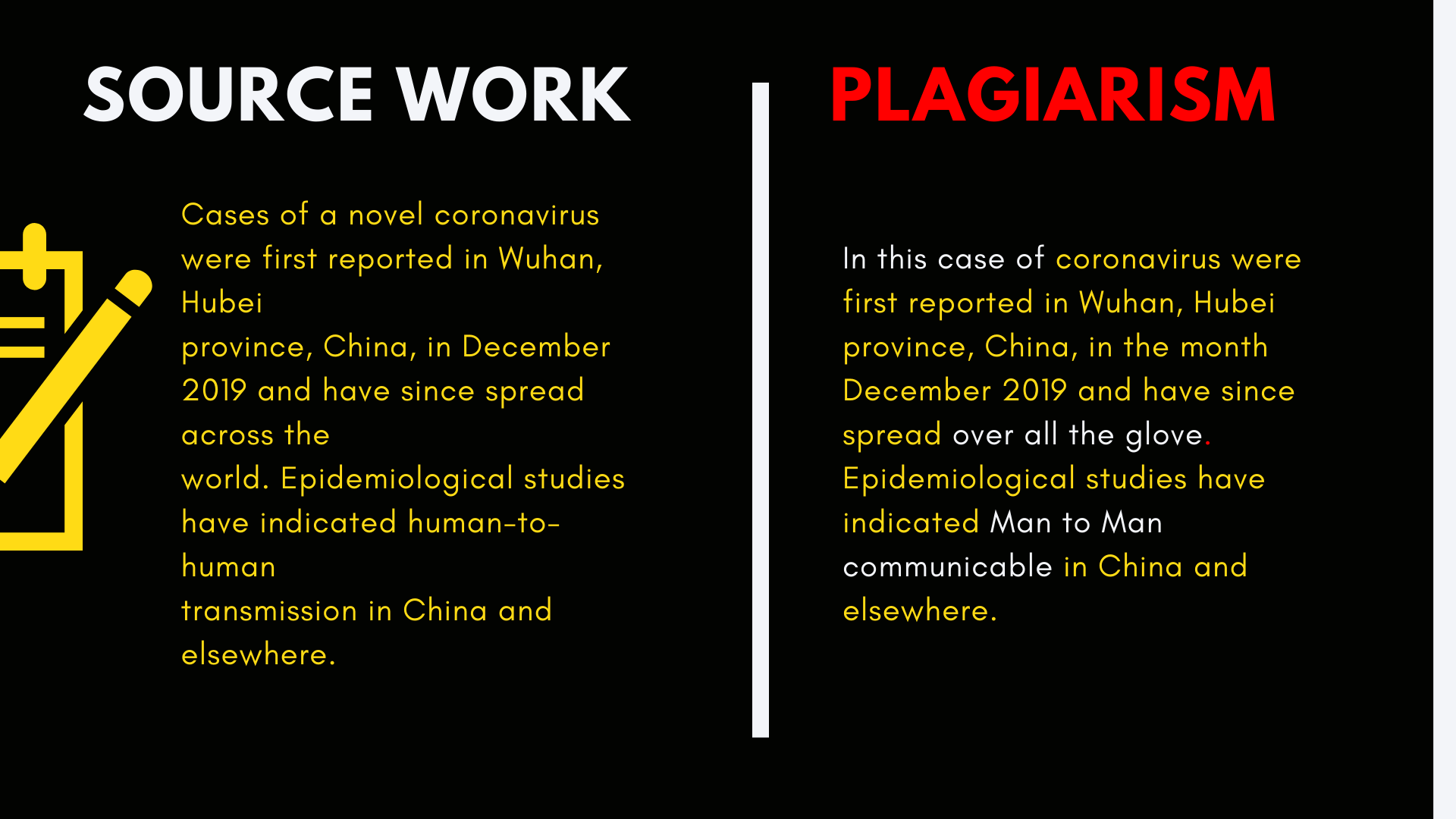Plagiarism Is A Form Of Copyright Infringement
Plagiarism Is A Form Of Copyright Infringement - Although they’re often used interchangeably, plagiarism and copyright infringement actually represent two different facets of intellectual property. The most widespread and also detectable cases of plagiarism occur in writing. Web plagiarism, on the other hand, is a harm that is grounded in ethics. Plagiarism occurs when you use someone else’s words or ideas without giving credit to the original author. With the absolute explosion of digital content (both production and consumption), plagiarism and copyright infringement have become increasingly intertwined and important. Web copyright infringement is the unauthorized use of another person’s original creative works, which includes literary, artistic, musical, or other types of content protected by copyright law. ( tech law journal) plagiarism is using someone else's work or ideas without giving proper credit. Copyright infringement is using someone else’s work without their consent. In academic writing, plagiarizing involves using words, ideas, or information from a source without citing it correctly. However, there is a difference between these two terms.
The most widespread and also detectable cases of plagiarism occur in writing. Web copyright infringement includes the unauthorized or unlicensed copying of a work subject to copyright. Plagiarism is using other people's original work without crediting them as the source. Copyright infringement can, in fact, constitute criminal behavior, as opposed to a civil infraction, and sometimes even rises to the level of a felony. Web copyright infringement is the unauthorized use of another person’s original creative works, which includes literary, artistic, musical, or other types of content protected by copyright law. It is the violation of the exclusive rights granted to a copyright owner, which are reproduction, distribution, performance, and display of the work. Is plagiarism a form of copyright infringement?
In practice, this can mean a few different things. How can i avoid it? Haliza said ip protection encourages industry players to compete in the market confidently, knowing their offerings will not be. Even if a work is properly cited and. Web plagiarism ≠ copyright infringement.
Web criminal charges can also be pressed on infringers of trademarks and copyrights if the ip owners lodge a complaint with the ministry of domestic trade and cost of living. Web plagiarism can be defined when someone commits passing off someone else’s work as their own whereas copyright infringement comes into effect when someone uses a copyrighted material without taking the permission of the copyright owner. If it’s plagiarism, it must be copyright infringement, and vice. The most widespread and also detectable cases of plagiarism occur in writing. Plagiarism is best defined as the unacknowledged use of another person’s work. How can i avoid it?
What are the differences between copyright and plagiarism? Even if a work is properly cited and. Web copyright infringement refers to the unauthorized use, reproduction, or distribution of copyrighted materials without permission from the copyright holder. Plagiarism and copyright infringement may have some overlap, but they are discrete considerations. Plagiarism is using other people's original work without crediting them as the source.
One can plagiarize someone else’s work regardless of the copyright status of that work. Web plagiarism is not a criminal offence. If it’s plagiarism, it must be copyright infringement, and vice. Plagiarism and copyright infringement may have some overlap, but they are discrete considerations.
Web Copyright Infringement Is A Violation Of Intellectual Property Laws.
( tech law journal) plagiarism is using someone else's work or ideas without giving proper credit. It is the violation of the exclusive rights granted to a copyright owner, which are reproduction, distribution, performance, and display of the work. In academic writing, plagiarizing involves using words, ideas, or information from a source without citing it correctly. Web criminal charges can also be pressed on infringers of trademarks and copyrights if the ip owners lodge a complaint with the ministry of domestic trade and cost of living.
What Are The Differences Between Copyright And Plagiarism?
Avoiding plagiarism is essential for academic scholars and professional writers. Web copyright infringement refers to the unauthorized use, reproduction, or distribution of copyrighted materials without permission from the copyright holder. All authors should be familiar with the difference between plagiarism and copyright infringement, and how to avoid them. Web is plagiarism a form of copyright violation?
Web Copyright Infringement Is The Unauthorized Use Of Another Person’s Original Creative Works, Which Includes Literary, Artistic, Musical, Or Other Types Of Content Protected By Copyright Law.
However, the act of plagiarism can infringe the intellectual property rights of others and can lead to legal action for ‘copyright infringement’ ‘or ‘trademark infringement’, which in turn can bring about legal charges, significant costs and reputational damage. Is plagiarism a form of copyright infringement? Legal consequences can include fines, damages, and injunctions against further infringement. However, there is a difference between these two terms.
Web The Biggest Difference Is That Copyright Infringement Is Illegal, While Plagiarism Is Not.
It is an ethical issue involving a claim of credit for work that the claimant did not create. With the absolute explosion of digital content (both production and consumption), plagiarism and copyright infringement have become increasingly intertwined and important. Plagiarism is using other people's original work without crediting them as the source. Although they’re often used interchangeably, plagiarism and copyright infringement actually represent two different facets of intellectual property.






